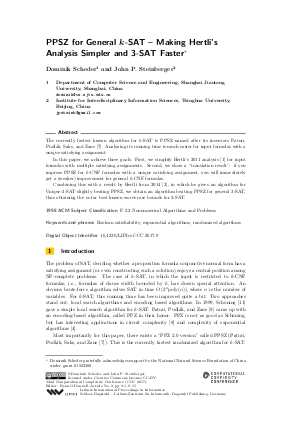PPSZ for General k-SAT - Making Hertli's Analysis Simpler and 3-SAT Faster
Authors Dominik Scheder, John P. Steinberger
-
Part of:
Volume:
32nd Computational Complexity Conference (CCC 2017)
Part of: Series: Leibniz International Proceedings in Informatics (LIPIcs)
Part of: Conference: Computational Complexity Conference (CCC) - License:
 Creative Commons Attribution 3.0 Unported license
Creative Commons Attribution 3.0 Unported license
- Publication Date: 2017-08-01
File

PDF
LIPIcs.CCC.2017.9.pdf
- Filesize: 0.54 MB
- 15 pages
Document Identifiers
Subject Classification
Keywords
- Boolean satisfiability
- exponential algorithms
- randomized algorithms
Metrics
- Access Statistics
-
Total Accesses (updated on a weekly basis)
0PDF Downloads0Metadata Views
Abstract
The currently fastest known algorithm for k-SAT is PPSZ named after its inventors Paturi, Pudlak, Saks, and Zane. Analyzing its running time is much easier for input formulas with a unique satisfying assignment. In this paper, we achieve three goals. First, we simplify Hertli's analysis for input formulas with multiple satisfying assignments. Second, we show a "translation result": if you improve PPSZ for k-CNF formulas with a unique satisfying assignment, you will immediately get a (weaker) improvement for general k-CNF formulas. Combining this with a result by Hertli from 2014, in which he gives an algorithm for Unique-3-SAT slightly beating PPSZ, we obtain an algorithm beating PPSZ for general 3-SAT, thus obtaining the so far best known worst-case bounds for 3-SAT.
Cite As Get BibTex
Dominik Scheder and John P. Steinberger. PPSZ for General k-SAT - Making Hertli's Analysis Simpler and 3-SAT Faster. In 32nd Computational Complexity Conference (CCC 2017). Leibniz International Proceedings in Informatics (LIPIcs), Volume 79, pp. 9:1-9:15, Schloss Dagstuhl – Leibniz-Zentrum für Informatik (2017)
https://doi.org/10.4230/LIPIcs.CCC.2017.9
BibTex
@InProceedings{scheder_et_al:LIPIcs.CCC.2017.9,
author = {Scheder, Dominik and Steinberger, John P.},
title = {{PPSZ for General k-SAT - Making Hertli's Analysis Simpler and 3-SAT Faster}},
booktitle = {32nd Computational Complexity Conference (CCC 2017)},
pages = {9:1--9:15},
series = {Leibniz International Proceedings in Informatics (LIPIcs)},
ISBN = {978-3-95977-040-8},
ISSN = {1868-8969},
year = {2017},
volume = {79},
editor = {O'Donnell, Ryan},
publisher = {Schloss Dagstuhl -- Leibniz-Zentrum f{\"u}r Informatik},
address = {Dagstuhl, Germany},
URL = {https://drops.dagstuhl.de/entities/document/10.4230/LIPIcs.CCC.2017.9},
URN = {urn:nbn:de:0030-drops-75355},
doi = {10.4230/LIPIcs.CCC.2017.9},
annote = {Keywords: Boolean satisfiability, exponential algorithms, randomized algorithms}
}
Author Details
References
- Timon Hertli. 3-SAT faster and simpler - unique-SAT bounds for PPSZ hold in general. In 2011 IEEE 52nd Annual Symposium on Foundations of Computer Science - FOCS 2011, pages 277-284. IEEE Computer Soc., Los Alamitos, CA, 2011. URL: http://dx.doi.org/10.1109/FOCS.2011.22.
- Timon Hertli. Breaking the PPSZ Barrier for Unique 3-SAT. In Javier Esparza, Pierre Fraigniaud, Thore Husfeldt, and Elias Koutsoupias, editors, Automata, Languages, and Programming - 41st International Colloquium, ICALP 2014, Copenhagen, Denmark, July 8-11, 2014, Proceedings, Part I, volume 8572 of Lecture Notes in Computer Science, pages 600-611. Springer, 2014. URL: http://dx.doi.org/10.1007/978-3-662-43948-7_50.
- Timon Hertli, Robin A. Moser, and Dominik Scheder. Improving PPSZ for 3-SAT using critical variables. In Proceedings of STACS, pages 237-248, 2011. URL: http://arxiv.org/abs/1009.4830.
- Russell Impagliazzo and Ramamohan Paturi. On the complexity of k-sat. J. Comput. Syst. Sci., 62(2):367-375, 2001. URL: http://dx.doi.org/10.1006/jcss.2000.1727.
-
Kazuo Iwama, Kazuhisa Seto, Tadashi Takai, and Suguru Tamaki. Improved randomized algorithms for 3-SAT. In Algorithms and Computation, volume 6506 of Lecture Notes in Comput. Sci., pages 73-84. Springer Berlin / Heidelberg, 2010.

-
Kazuo Iwama and Suguru Tamaki. Improved upper bounds for 3-SAT. In Proceedings of the Fifteenth Annual ACM-SIAM Symposium on Discrete Algorithms, pages 328-329 (electronic), New York, 2004. ACM.

- Ramamohan Paturi, Pavel Pudlák, Michael E. Saks, and Francis Zane. An improved exponential-time algorithm for k-SAT. J. ACM, 52(3):337-364 (electronic), 2005. URL: http://dx.doi.org/10.1145/1066100.1066101.
-
Ramamohan Paturi, Pavel Pudlák, and Francis Zane. Satisfiability coding lemma. Chicago J. Theoret. Comput. Sci., pages Article 11, 19 pp. (electronic), 1999.

-
Daniel Rolf. Improved Bound for the PPSZ/Schöning-Algorithm for 3-SAT. Journal on Satisfiability, Boolean Modeling and Computation, 1:111-122, 2006.

- Dominik Scheder, Bangsheng Tang, Shiteng Chen, and Navid Talebanfard. Exponential lower bounds for the PPSZ k-sat algorithm. In Sanjeev Khanna, editor, Proceedings of the Twenty-Fourth Annual ACM-SIAM Symposium on Discrete Algorithms, SODA 2013, New Orleans, Louisiana, USA, January 6-8, 2013, pages 1253-1263. SIAM, 2013. URL: http://dx.doi.org/10.1137/1.9781611973105.91.
- Uwe Schöning. A probabilistic algorithm for k-SAT and constraint satisfaction problems. In Proceedings of the 40th Annual Symposium on Foundations of Computer Science, pages 410-414. IEEE Computer Society, Los Alamitos, CA, 1999. URL: http://dx.doi.org/10.1109/SFFCS.1999.814612.
